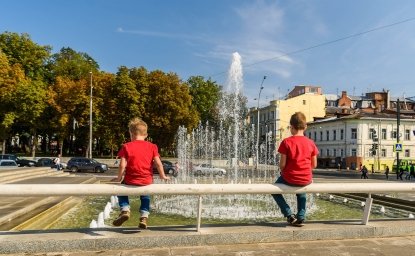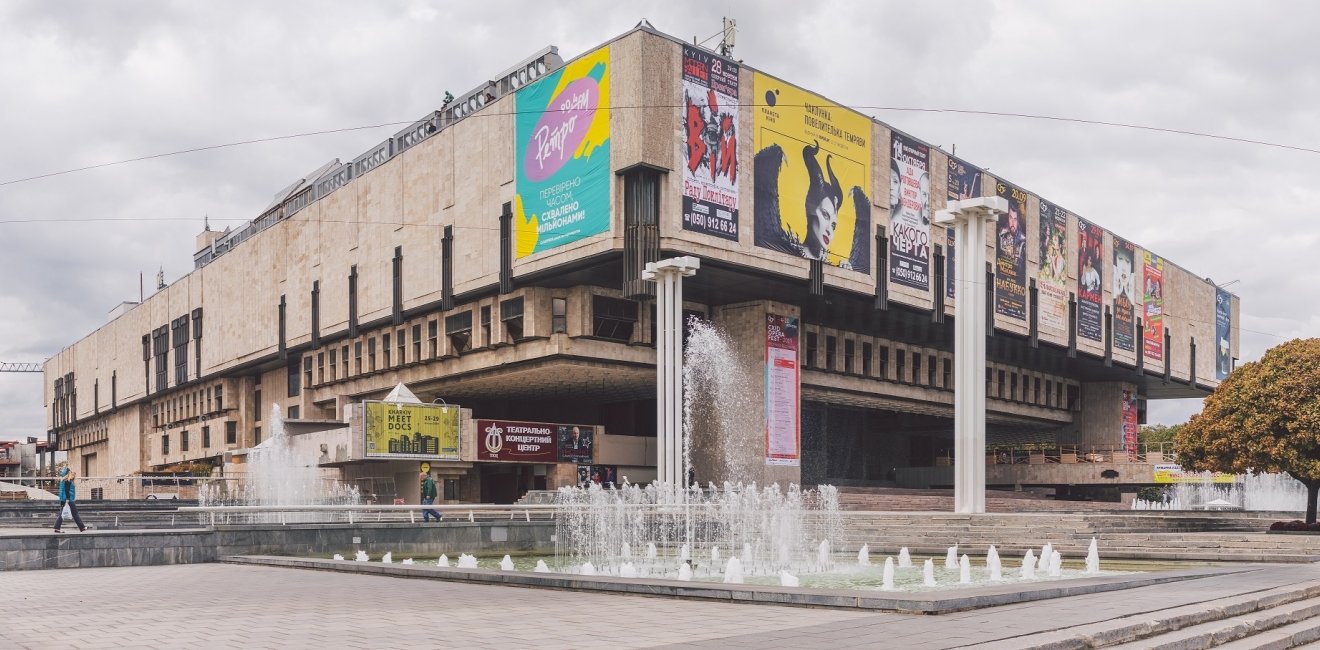BY BLAIR A. RUBLE
On April 5, with the city aboveground ravaged by Russian rockets, baritone Volodymyr Kozlov of the Kharkiv National Theater of Opera and Ballet descended into a nearby subway station to serenade those who had sought shelter there. Operatic tenors almost always get to play heroes, baritones and basses not so much. The lower the vocal range, it seems, the greater the villainy. On this occasion Kozlov was a grandest hero of all, comforting those who needed it most to the accompaniment of a dozen stringed instruments as he dug into his repertoire of Italian operas.
Kozlov began his career with the opera in 2008 following his graduation from the local Kharkiv National University of the Arts. He rose steadily through the ranks, from the chorus to leading roles, and extended his appearances into Europe and China, earning the honorarium “Honored Artist of Ukraine.”
The Kharkiv National Theater traces its history back to the first permanent opera companies in the city in 1876. More formally, the theater was established in 1925 when Kharkiv was capital of Soviet Ukraine. The company earned particular note in the years prior to World War II for its presentation of more than thirty operas and eleven ballets on Ukrainian themes. The theater recovered from the war, though by the 1970s, in response to the Soviet de-Ukrainianization cultural policies, the number of Ukrainian works in its repertoire was severely reduced. The company utilized the new opportunities unleashed by Ukrainian independence to promote new Ukrainian works.
During the brief interlude between the COVID epidemic and the Russian invasion, the company staged one of the most ambitious new Ukrainian operas: Vyshyvaniy. the King of Ukraine. This large-scale work tells the remarkable story of Hapsburg Archduke Wilhelm of Austria, who donned a Ukrainian embroidered shirt—the vyshyvanka—and fought with the Ukrainian partisan Sich Riflemen (Sichovi Striltsi) against Nazi and Soviet occupation. Wilhelm was arrested in the American zone of occupied Vienna in March 1947 by Austrian police responding to complaints about a loud birthday party. The police turned him over to Soviet authorities. He died at the age of fifty-three in Soviet detention in August 1948.
The October 2021 production featured modern acoustic and electronic music composed by Alla Zahaykevych, with a libretto by Serhiy Zhadan, and was directed by Rostyslav Derzhypilsky. The metaphorical staging featured some 300 characters performing the contemporary choreography of Olya Semyoushkina among stage sets designed by Olesya Holovach. Zahaykevych is among Ukraine’s most successful classical composers and Zhadan is one of the country’s leading writers. Zhadan frequently collaborates with Kharkiv-based musicians in a number of genres and is a leading figure in the city’s postindependence cultural renaissance.
Founded as a fortress settlement of empire in 1654, Kharkiv grew into a major industrial and cultural center during the nineteenth century. Its university, founded in 1804 as one of the Russian Empire’s earliest institutions of higher learning, became a center for promoting Ukrainian literature soon thereafter. The Bolsheviks, unsure of their control over the rest of Ukraine, named Kharkiv their Ukrainian capital in December 1919. The city remained a major industrial and educational center following the relocation of the capital to Kyiv in January 1934. It continued to be a major military defense industry center throughout the Soviet period and grew as a metropolitan region to be home to over two million before Russia’s current invasion.
Independence-era Ukraine created fresh opportunities for Kharkiv to flourish intellectually and culturally. Karamzin University became just one of several more specialized universities that were among the most innovative in Ukraine. The literary scene, featuring Zhadan and dozens of other authors, rivaled that of many cities across Europe and Eurasia. Music thrived, as evident in the YouTube videos of musicians playing amid the wreckage wrought by the Russians. Immigrants from Africa, Asia, and the Middle East contributed to the increasingly diverse and innovative cultural scene as well.
Kharkiv and its cultural institutions have endured too many invasions to submit to Russian brutality. The city and its culture will emerge again, producing inspiring creative works such as Vyshyvaniy. the King of Ukraine. And when that happens, hero baritone Volodymyr Kozlov undoubtedly will return to stage villainy once more.
The opinions expressed in this article are those solely of the authors and do not reflect the views of the Kennan Institute.
Author

Former Wilson Center Vice President for Programs (2014-2017); Director of the Comparative Urban Studies Program/Urban Sustainability Laboratory (1992-2017); Director of the Kennan Institute for Advanced Russian Studies (1989-2012) and Director of the Program on Global Sustainability and Resilience (2012-2014)

Kennan Institute
The Kennan Institute is the premier US center for advanced research on Eurasia and the oldest and largest regional program at the Woodrow Wilson International Center for Scholars. The Kennan Institute is committed to improving American understanding of Russia, Ukraine, Central Asia, the South Caucasus, and the surrounding region through research and exchange. Read more

Explore More
Browse Insights & Analysis
Talking to the Dead to Heal the Living

Mustached Bards: Revisiting Soviet Ukrainian Pop Music

Creating Rules of the Game for Contemporary Ukrainian Theater

